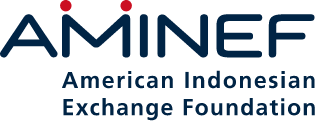Susan Lynn Williams is a recipient of the Fulbright Specialist Program, field of study Environmental Sciences at Universitas Hasanuddin in 2016.
Indonesia holds some of the most diverse marine life on earth, held in its coastal ecosystems of mangroves, seagrass, and coral reefs. These ecosystems support many economically valuable fisheries and help protect coasts from storm damage, erosion, and sea level rise. Many millions of humans depend on these ecosystems for food and livelihoods. Coastal marine ecosystems are being degraded or lost at very fast rates, often due to human activities along the coasts. The development of effective means to restore these ecosystems is critical to slow or reverse such degradation.
In response to such a situation, Faculty and students at Hasanuddin University collaborated with Fulbright Specialist Susan L. Williams, a Distinguished Professor from the University of California at Davis and the Bodega Marine Laboratory, on coastal marine science issues. The collaboration was from October 2017 through March 2018 and supported by the Fulbright Specialist Program and AMINEF. The collaboration included various activities, including the joint development of research questions and the infrastructure required to carry it out, analysis of data already collected, workshops on writing papers for international peer review of the research, and an international symposium on seaweed aquaculture.
The major activities focused on increasing capacity of faculty and students in experimental design and data analysis and writing manuscripts to submit for international level publications. The benefit of the Fulbright Specialist work was a demonstrable increase in marine science capacity within Hasanuddin University. The faculty, in response to the directives of the Indonesian Ministry of Education and their own aspirations, set a goal of increasing their international level science publications and thus increasing the international ranking of the University. The faculty realize that their manuscripts submitted for publication are rejected primarily due to inadequate or inappropriate experimental design and analysis, which is a more fundamental issue than writing in English, which also remains a challenge. They are challenged because until recently, publication in Indonesian journals was sufficient for their academic advancement. Yet, they have few role models, limited access to international journals due to the high cost of subscriptions, and this faculty in particular lacks staff experts in statistics.
They thus focused on workshops on experimental design and analysis and individual and small group mentoring for specific research studies. The benefits were demonstrated by increased faculty participation from the serial visits (October 2017 and February 2018), an increase in accepted and submitted manuscripts, and more active questioning about experimental design. Clearly faculty and graduate students had spent time between visits to absorb information presented earlier. Specifically, the concept of appropriate experimental controls, replication, and independence of replicates was embraced. They also were able to discuss the process of defining a research question of more than local interest. Some faculty also posed questions about the ethical conduct of science and appropriate attribution of credit in publications.
Graduate students very quickly put standards into practice, not surprisingly because, as is universal, they have more time to focus on research than do faculty. Students first had to become comfortable enough with me to breach the institutional hierarchy and approach me directly for mentoring. This is another benefit of serial visits.
In addition to the work on marine science capacity building, they worked together on projects for sea grass and coral reef restoration. They also collaborated on improving methods for seaweed aquaculture in coastal regions, which provides a high value marine ‘crop’, and also on making it environmentally sustainable. Field trips to observe experiments underway in the Spermonde Islands were conducted. Consultation on marine science infrastructural needs was also accomplished. They shared information on how we train students and planned future student exchanges between Indonesia and the U.S. They plan to collaborate for a long time as the coastal environmental issues will continue into the future and as more food provided by the ocean is needed to support a growing world population. Susan feels fortunate to be able to collaborate with exceptionally generous UNHAS faculty and students. She said that she pursued becoming a Fulbright Specialist as a University of California-Davis professor because it represented an exceptional opportunity to collaborate and to experience Indonesia’s special coastal marine ecosystems and how Indonesian scientists are approaching the problems that are common worldwide.
As UNHAS is the primary higher education institution for eastern Indonesia, its marine science faculty are responsible for training scientists who will eventually become professors or assume resource management positions in the various levels of government. An understanding of the basics of experimental design and analysis is fundamental to their ultimate success. UNHAS is also striving to increase its Indonesian and international ranking. It seeks experts who can build capacity toward more successful research and publication at international levels. It welcomes anyone who can provide such assistance, particularly scientists who can stay more than a day or so and who are willing to spend the time necessary to support their goals.
***
Prof. Susan Williams is a marine biologist at the Bodega Marine Laboratory, the University of California at Davis. Her research focuses on the ecology of nearshore marine ecosystems, particularly seagrass and seaweed beds and coral reefs.
She comes to Indonesia under the Fulbright Specialist Program to collaborate with Hasanuddin University’s faculty and students. During her two visits in October 2017 and February 2018, she will work closely with UNHAS faculty and students on seaweed aquaculture and seagrass and coral rehabilitation. She is also providing input on UNHAS’s plans to build world-class marine research laboratories and also on experimental designs and preparation of manuscripts for publication.
Interested in hosting or inviting professor / expert from the US ? Write to us at usseniorscholar@aminef.or.id.
Last Updated: Mar 31, 2024 @ 2:16 am



